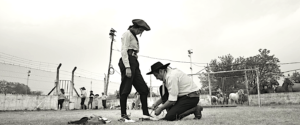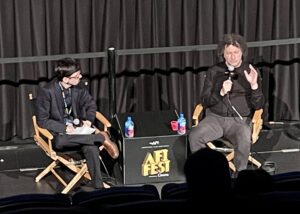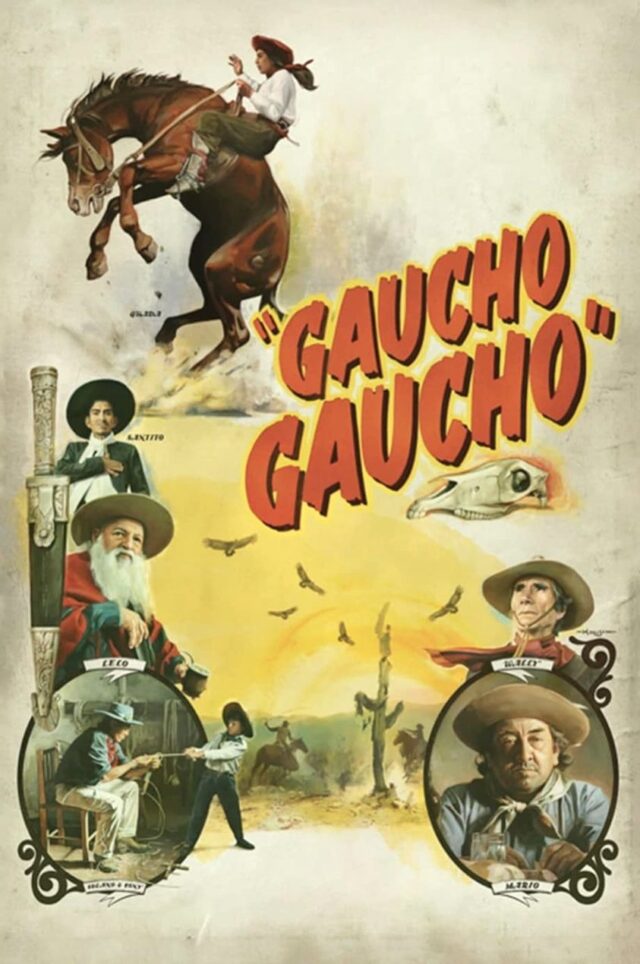By Robert St. Martin
 Los Angeles, CA (The Hollywood Times) 10/24/24 – Gaucho Gaucho is a 2024 documentary film directed by Michael Dweck and Gregory Kershaw that celebrates Argentine Gauchos, a community of cowboys and cowgirls living beyond the modern world’s boundaries. The film, set in the lack of water-threatened northwestern cattle country of Argentina, captures the lives of gauchos. The documentary screened at the AFI FEST 2024 in Hollywood on Wednesday, October 23. As was explained at the Q&A after the screening, the doubling of the word “Gaucho” in the title refers to real Gauchos, as opposed to those who just dress up and pretend to be traditional riders of the pampas.
Los Angeles, CA (The Hollywood Times) 10/24/24 – Gaucho Gaucho is a 2024 documentary film directed by Michael Dweck and Gregory Kershaw that celebrates Argentine Gauchos, a community of cowboys and cowgirls living beyond the modern world’s boundaries. The film, set in the lack of water-threatened northwestern cattle country of Argentina, captures the lives of gauchos. The documentary screened at the AFI FEST 2024 in Hollywood on Wednesday, October 23. As was explained at the Q&A after the screening, the doubling of the word “Gaucho” in the title refers to real Gauchos, as opposed to those who just dress up and pretend to be traditional riders of the pampas.
Gaucho Gaucho premiered at the 2024 Sundance Film Festival, where it won a Special Jury Prize for Sound. The documentary received an outdoor screening in August 2024 on the Piazza Grande of the 77th Locarno Film Festival and won the first Letterbox Piazza Grande Award. At the AFI FEST 2024 screening on Wednesday evening, Michael Dweck talked about the processing of finding this community of gauchos in northeast Argentina near Salta and how he and his co-director built the trust of the local people in letting them film parts of their daily lives.

Gaucho Gaucho opens on a pristinely framed, lushly monochromatic shot of something that can only, at first glance, be described as an unidentified lying object. On a flat expanse of matted grassland, under a rolling widescreen canvas of sky, the camera centers a large, dark clump of what may be rock, earth or animal matter. Eventually it stirs, revealing the folds of its composition. A man rises from his slumber, clad in high boots, wide-brimmed hat and layers of hard-wearing fabric; then a horse’s head emerges from the mass, shaking and snorting and returning awkwardly to its feet.

When it comes to intimately observed portraits of particular rural subcultures living proudly out of time, Dweck and Kershaw have form. Their previous feature, 2020’s The Truffle Hunters, examined the aging menfolk of Alba, Italy, and their earthy pursuit of the Alba truffle: a quarry regarded with the same reverence that the gauchos here afford their horses, their environment and their own cultural legacy.
This is an apt visual representation of the close kinship between human life, animal life and landscape that defines the Argentine cowboy community; in frame after perfectly composed frame, Michael Dweck and Gregory Kershaw‘s loving, visually resplendent documentary gives them ample space to bond and merge.
 Gaucho Gaucho is, like its predecessor, shot and composed with fastidious beauty — this time in satiny, high-contrast black and white — but marked with just enough witty, peculiar character portraiture. Structurally, the film is a wandering ensemble piece, its focus shifting between an array of folk within a small cattle-farming community on the Argentine pampas near Salta and the mountains. The film is tightened by the very closeness of the people under scrutiny, the sense that all its individual stories are being communally observed.
Gaucho Gaucho is, like its predecessor, shot and composed with fastidious beauty — this time in satiny, high-contrast black and white — but marked with just enough witty, peculiar character portraiture. Structurally, the film is a wandering ensemble piece, its focus shifting between an array of folk within a small cattle-farming community on the Argentine pampas near Salta and the mountains. The film is tightened by the very closeness of the people under scrutiny, the sense that all its individual stories are being communally observed.The most engaging of these threads, lending proceedings a somewhat consistent narrative spine, centers on Guada, an independent-minded teenage girl who yearns to join the predominantly male gaucho set, and to prove herself on a local rodeo circuit that isn’t for the faint-hearted. We’re introduced to her at her high school, where she rejects the prescribed uniform for the traditional equestrian gear of the gaucho, topped with a rakishly oversized beret, as her peers look on in amusement. When a teacher asks her to change, Guada’s refusal is matter of fact: “I’m a gaucha, and this is my clothing.”
 Certainly, she has little use for formal schooling: The education she cares about comes from her male gaucho elders on the farm, who patiently teach her how to gain a horse’s trust, before moving on to more expert intricacies of riding and rodeoing. Progress is slow, moving one trot forward and two back: Dweck and Kershaw avert their camera as Guada heads into her first rodeo, instead cutting drolly to her hobbling along the ground on crutches shortly afterwards.
Certainly, she has little use for formal schooling: The education she cares about comes from her male gaucho elders on the farm, who patiently teach her how to gain a horse’s trust, before moving on to more expert intricacies of riding and rodeoing. Progress is slow, moving one trot forward and two back: Dweck and Kershaw avert their camera as Guada heads into her first rodeo, instead cutting drolly to her hobbling along the ground on crutches shortly afterwards.“I don’t plan on being a mother,” she shrugs, as others voice concerns about the potential impact of her injuries. We’re left to intuit what else this might say about her inner life and desires: In line with the ruminative, hands-off approach of their previous work, the filmmakers eschew interviews for overheard conversations and ambiently observed alone time.
 Other human subjects in Gaucho Gaucho include Santino, a flamboyant sometime musician who, as the host of a local radio show about gaucho culture, is more outward facing than many of his brethren. Others, like Solano, are simply happy to keep the knowledge within the family. His five-year-old son Jonny receives every morsel of paternal cowboy wisdom with porous, wide-eyed enthusiasm; as with Guada’s gender-defying determination, the film shows the gaucho lifestyle, however seemingly divorced from modernity, making generational strides. That might be cold comfort to Lelo, a grizzled octogenarian still eager to prove himself an asset to the community — though these days he mostly has tall stories to offer.
Other human subjects in Gaucho Gaucho include Santino, a flamboyant sometime musician who, as the host of a local radio show about gaucho culture, is more outward facing than many of his brethren. Others, like Solano, are simply happy to keep the knowledge within the family. His five-year-old son Jonny receives every morsel of paternal cowboy wisdom with porous, wide-eyed enthusiasm; as with Guada’s gender-defying determination, the film shows the gaucho lifestyle, however seemingly divorced from modernity, making generational strides. That might be cold comfort to Lelo, a grizzled octogenarian still eager to prove himself an asset to the community — though these days he mostly has tall stories to offer.After spending almost three years living in the community, Dweck and Kershaw are more than happy to buy into the community’s self-mythologizing, to absorb the hand-me-down stories and macho iconography that keep the romance of the gaucho alive. And they assist in this regard by presenting this world with swoony impressionistic flourishes of their own, both in their emphatically aestheticized lensing — with its nods to both vintage Hollywood westerns and the starkly scarred landscape photography of Ansel Adams — to their exhilaratingly eclectic soundtrack choices. The jangly local rock ‘n’ roll of Argentine band Los Gatos’ single “La Balsa” fits, but so does a stately selection from Bizet’s The Pearl Fishers: a French aria about male friendship tested by grander passions that, in the moment, feels written for galloping cowboys stamping their own legend on the plains.






